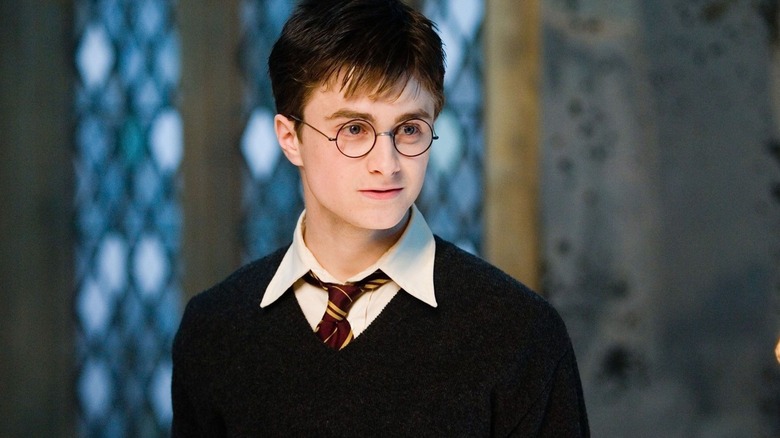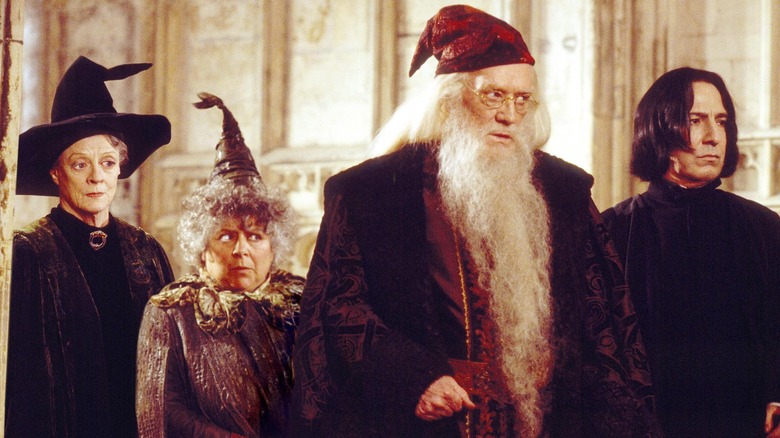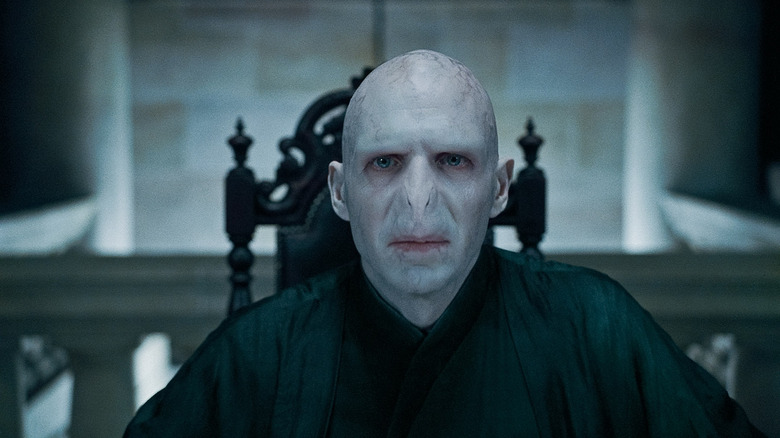J.K. Rowling's Involvement In Max's Harry Potter Series Has Set The Internet Ablaze – And Rightfully So
There's an episode of the criminally under-seen "Los Espookys" — which you can stream on HBO Max — that's been on my mind as of late. Titled "Las Muchas Caras de un Hombre" ("One Man's Many Faces"), the episode sees the show's oddball protagonists forced to work a second time for one of their least-favorite clients, Dr. Lucrecia. A controlling and incompetent scientist who squanders her boss' money pretending to research extra-terrestrial life, Dr. Lucrecia has decided her husband is the real cause of all her problems. Forget that her husband, who seems mostly harmless (if also hapless), has had nothing to do with her bad behavior in the past. Dr. Lucrecia keeps insisting that's the case until those around her simply give up trying to convince her otherwise.
Why, you may ask, is this weirdo going on about a relatively obscure Spanish-language absurdist comedy series in an article supposedly about the controversy over J.K. Rowling being prominently listed as a key creative on Max's newly-confirmed "Harry Potter" series? Well, it's partially because I want to encourage more people to watch this delightfully queer TV show or, really, any other LGBTQ+-friendly series ("Our Flag Means Death" is right there on Max, folks!) than the latest rubbish bearing Rowling's name. But more than that, I want to highlight just how ridiculous (riddikulus?) people sound when they ardently defend Rowling against accusations of transphobia.
What does it matter that there are meticulously-researched, fact-based articles detailing Rowling's history of transphobic comments and conduct? Like Dr. Lucrecia in "Los Espookys," her supporters refuse to acknowledge the reality of the situation, much less hold Rowling accountable. The folks with dollar signs in their eyes at Warner Bros. Discovery aren't much better, either, as we saw after the "Harry Potter" reboot was made official during their special presentation this week.
There's nothing 'online' about human rights
Let me be frank: a "Harry Potter" reboot series is a terrible idea in a creative sense alone. The original film adaptations were already hampered by their excessive faithfulness to J.K. Rowling's source material, despite some excellent filmmaking and a fantastic cast. A show that rehashes the movies' plot only stretched out over a decade (!) and with, most likely, surface-level changes to try and make it feel more progressive and inclusive ... well, it sounds like something with big Disney live-action remake energy, let's put it that way.
Unfortunately, as we've seen with most of Disney's remakes, that also means a lot of people will watch it, quality be damned. WBD is clearly counting on that, which is why they're so willing to court controversy by flaunting Rowling's involvement in everyone's face. Yet, as though to add insult to injury, Max and HBO Content Head Casey Bloys couldn't even muster a half-decent BS justification when asked to address the elephant in the room during a Q&A after WBD's special presentation. In his own words (via IndieWire):
"No, I don't think this is the forum. That's a very online conversation, very nuanced and complicated, and not something we're going to get into."
That sounds less like the statement you would expect from a real-life executive who undoubtedly knew this question was coming and had plenty of time to prepare in advance, and more like the sort of waffle answer Tom Wambsgans would sputter out during a press event on "Succession." Bloys quickly tried to save face, calling "Harry Potter" an "incredibly affirmative and positive [story] about love and self-acceptance," and that "[Rowling's] insights are going to be helpful on that." But the real message was clear: Who cares about human rights when there's moola to be made, and lots of it?
Say it with me: all art is political
Thankfully, people across the Internet have been weighing in with righteously angry, eloquently stated reactions to this matter. "Let's be absolutely clear about this," tweeted writer/critic and /Film contributor Kayleigh Donaldson, "there is no apolitical way to support a thing that requires you to keep giving money to a transphobe who pals around with fascist-adjacent bullies and is regularly cited as an expert by politicians pushing anti-trans legislation." She added:
I don't care how "affirming" the message of the books is. I don't care how sad you'll be if you can't Twitch-stream a video game. I don't care that you're such a Ravenclaw and just want people to get along. You made your choice. You don't get to pretend you're fence-sitting.
— Kayleigh Donaldson (@Ceilidhann) April 12, 2023
In addition to taking Casey Bloys to task for his flimsy answer ("We obviously don't agree with Rowling's bigoted views, but we like money and can't make this without enriching her, and there aren't actually a lot of trans people so ... sorry, suckers!!!!"), writer Emily St. James echoed my earlier statement about the original "Harry Potter" films being "faithful" to a fault:
The ways in which I'm annoyed by this, ranked:
1.) As a trans person
2.) As a person aware of other bigotry in Rowling's work
3.) As someone who thinks adaptations SHOULDN'T be "faithful"
4.) As someone who WANTS THERE TO BE SOME NEW STORIES OKAY?— Emily St. James (@emilystjams) April 12, 2023
Writer/critic Kathryn VanArendonk elaborated on this in an essay titled "There is No Such Thing As a Faithful Adaptation." Tweeting about the subject, VanArendonk expanded on how J.K. Rowling's specific, muddled approach to "faithfulness" makes it impossible to separate her politics and personal statements from her art, explaining:
"But with an author like Rowling, who has become well known for continually fiddling with and adjusting and burnishing all sorts of little details about her work, any claim of 'faithfulness' has to wrestle with what exactly it's being faithful TO."
Likewise, as writer/critic Siddhant Adlakha observed, Rowling's close involvement only further assures "anyone involved creatively [with the reboot] is going to end up in such a bind. No way they'll be allowed to re-interpret — not when the brand is so recognizable it's pasted all over theme parks — which'll set everyone up for failure."
It really doesn't matter which way you cut it: everything about this project is more cursed than the child of Voldemort.


